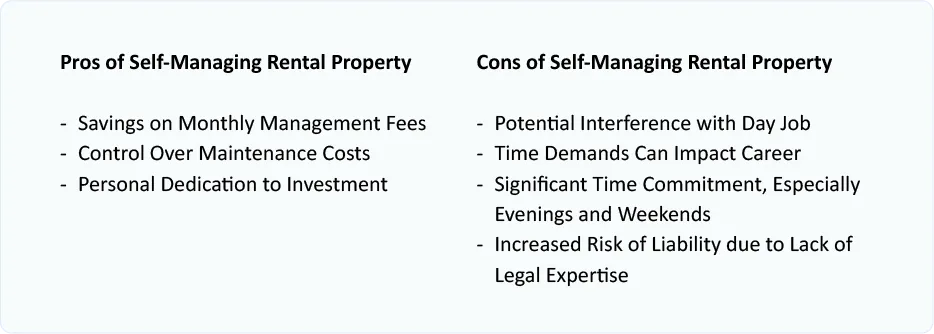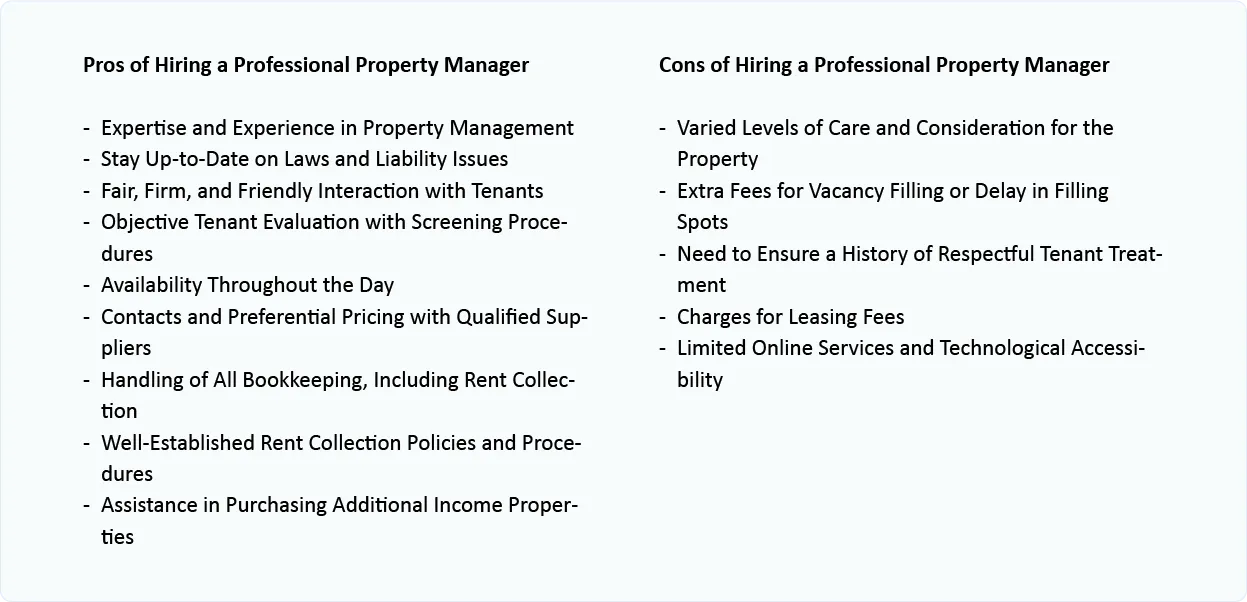Do You Have What It Takes to Manage Your Own Rental Property?
In a city like Toronto, where property values are high, and rents are at a premium, many investors are keen to consider buying an investment property.
Depending on how cost-sensitive an investor is, self-management might be a consideration. Before taking the plunge, it’s crucial to understand what the responsibilities in property management are and assess whether you have what it takes to be successful.
In this article we’ll explore the pros and cons of both options. It’s an insightful journey that will equip you with the knowledge needed to make an informed decision. And, to make things even more interesting, you’ll find a self-assessment to help you determine if property management is for you, or, for the professionals.
You might be interested: LandLord Chosen as Top Property Management Company for 2024
Defining What’s Property Management
Property management is a field within real estate that involves the operation, oversight, and administration of real estate properties on behalf of the property owner.
The primary goal of property management is to ensure that a property is well-maintained, generates rental income, and retains or increases its value over time. Property managers act as intermediaries between property owners and tenants, handling various responsibilities related to the day-to-day functioning of the property.
That’s a People Business
Successfully managing rental properties involves a unique blend of skills, including communication, organization, and problem-solving. While handling physical aspects like property maintenance and financial tracking may seem straightforward, the most challenging aspect often revolves around managing people.
A property manager’s interactions extend beyond tenants to include prospects, contractors, vendors, neighbors, government employees, and various other individuals.
To better illustrate the statements above, let’s look into a few examples of how people skills play a crucial role in the day-to-day tasks of a property manager.
Communication Skills:
- Scenario 1: Imagine a tenant expressing concerns about a persistent maintenance issue. Effective communication involves actively listening to their concerns, asking clarifying questions, and clearly conveying the steps being taken to address the problem. Clear communication fosters trust and ensures both parties are on the same page.
Conflict Resolution:
- Scenario 2: When two tenants have a disagreement over shared spaces or noise complaints, a property manager with strong conflict resolution skills can step in. By mediating the conversation, understanding each party’s perspective, and finding a compromise, conflicts can be resolved amicably, maintaining a harmonious living environment.
Empathy:
- Scenario 3: A tenant may face unforeseen financial difficulties, making it challenging to pay rent on time. An empathetic property manager understands the tenant’s situation, explores potential solutions such as payment plans, and provides support. This empathetic approach helps build positive tenant-manager relationships.
Negotiation Skills:
- Scenario 4: In the process of leasing negotiations, a property manager with strong negotiation skills can secure favorable terms for both the landlord and the tenant. This involves finding common ground, understanding priorities, and reaching an agreement that satisfies both parties.
Adaptability:
- Scenario 5: Property managers often encounter unexpected challenges, such as sudden maintenance issues or changes in local regulations. An adaptable individual can quickly assess the situation, adjust plans accordingly, and communicate effectively with all parties involved to ensure a smooth resolution.
The Responsibilities You Get When You Decide to Self Manage
Property management involves a multifaceted array of responsibilities, from tenant search and screening to the swift resolution of maintenance issues.
We listed below the key responsibilities involved in effective property management:
- Tenant Screening: Conduct comprehensive background checks and assessments to select reliable and responsible tenants.
- Leasing and Documentation: Prepare and manage leasing agreements, ensuring all legal and contractual obligations are met.
- Rent Collection: Implement efficient rent collection processes, including handling late payments and addressing financial matters.
- Maintenance and Repairs: Oversee regular maintenance and address repair needs promptly to ensure the property is well-maintained.
- Property Inspections: Conduct periodic inspections to assess the condition of the property and identify any potential issues.
- Financial Management: Manage financial aspects, including budgeting, accounting, and payment of property-related expenses.
- Tenant Relations: Foster positive relationships with tenants, address concerns, and ensure a harmonious living environment.
- Legal Compliance: Stay informed and ensure compliance with local, state, and federal housing laws and regulations.
- Marketing and Advertising: Develop and implement effective marketing strategies to attract potential tenants and minimize vacancies.
- Emergency Response: Establish and implement emergency response plans to address unexpected situations promptly.
- Eviction Proceedings: Handle eviction processes professionally and in accordance with legal requirements when necessary.
- Record-Keeping: Maintain accurate and organized records related to property management activities and transactions.
The Pros and Cons
When it comes to managing your property independently, it’s evident that there’s a mix of advantages and challenges.
To help you make a well-informed decision, we’ll explore a detailed list of both the benefits and potential drawbacks, that will further allow you to weigh the options and decide what aligns best with your goals and preferences.

Additional Details:
Pros of Self-Managing Rental Property:
- Savings on Monthly Management Fees: By self-managing, you save on the monthly fees associated with hiring a professional property manager.
- Control Over Maintenance Costs: You have the flexibility to decide on repair work and maintenance tasks, potentially saving on costs.
- Personal Dedication to Investment: As the owner, you are inherently more dedicated to achieving the best results from your rental investment.
Cons of Self-Managing Rental Property:
- Potential Interference with Day Job: Managing property demands may interfere with a full-time professional’s day job, potentially damaging career prospects.
- Time Demands Can Impact Career: The unpredictable and time-consuming nature of property management, especially during evenings and weekends, may have adverse effects on personal and professional schedules.
- Increased Risk of Liability: Part-time property managers may lack up-to-date knowledge on laws affecting the rental housing industry, increasing the risk of legal issues and liabilities.
On the flip side, we’ve also compiled a list of the advantages and disadvantages of opting for a professional property management company.

Hiring a professional property manager comes with several advantages. These experts bring invaluable expertise and experience to efficiently handle the intricacies of residential rental property management. They stay abreast of federal, state, and local laws, including liability issues like mold and fair-housing policies.
Property managers maintain fair, firm, and friendly relationships with tenants, employing screening procedures to objectively evaluate potential tenants. They provide continuous property management throughout the day, with staff available for after-hour emergencies.
Additionally, property managers have established contacts and preferential pricing with suppliers, vendors, and contractors, ensuring quick and efficient work completion.
They handle all bookkeeping, rent collection, and possess an online presence, offering detailed information about available rental properties. Property managers can also assist in purchasing additional income properties, often having early knowledge of clients looking to sell.
On the other hand, there are certain drawbacks to consider when hiring a professional property manager. For small residential properties, the management fees, which can run up to 10 percent or more of gross income, may not be cost-effective.
Some smaller companies may lack technological advancements, limiting their ability to provide online services expected by tenants. Additionally, certain management companies may have in-house maintenance personnel or affiliated contractors who charge markups or surcharges, potentially leading to increased costs.
Property owners should be cautious about hidden profit centers that may prioritize lucrative maintenance and repairs over proper property management. Despite the advantages, property owners need to ensure that the selected property management company has a track record of treating tenants respectfully and prioritizing the owner’s interests.
Ok, So What Makes a Good Property Manager?
A competent property manager is someone well-versed in all facets of the industry, capable of handling every aspect of property management.
More than just a professional overseeing operations, they are individuals deeply invested in the well-being of your property, driven to enhance its value.
Recognizing the interconnected nature of the process, they understand that securing quality tenants is pivotal for preventing damage and ultimately boosting property value—a cyclical relationship.
A top-notch property manager goes beyond the basics, genuinely caring about every stage of the property management journey.
From the initial tenant selection to the final touches, they prioritize the welfare of those living in the property. Their expertise shines through in various strategic initiatives, whether it’s adjusting rental prices, implementing preventative maintenance measures, or strategically guiding renovations to boost property value.
In essence, a skilled property manager excels not only in people skills but also possesses a strategic mindset, ensuring the holistic enhancement of your property’s value.
Self-Assessment: Do you Have What it Takes?
Managing rental properties requires a unique set of skills to navigate the challenges effectively. Take a moment for a self-assessment to determine if you possess these essential qualities:
• Can you effectively communicate with tenants, prospects, contractors, and other stakeholders?
• Are you adept at resolving conflicts and addressing concerns diplomatically?
• How well do you manage and prioritize tasks related to property maintenance, rent collection, and documentation?
• Are you proficient in keeping accurate records of income, expenses, and property details?
• Do you approach challenges with a proactive and solution-oriented mindset?
• Can you handle unexpected issues efficiently and make informed decisions under pressure?
• Are you comfortable interacting with a diverse range of individuals, including tenants, vendors, and government employees?
• How well do you navigate relationships to create a positive and cooperative living environment?
• Can you allocate time effectively to handle various responsibilities associated with property management?
• Do you have the capacity to meet deadlines and respond promptly to tenant needs?
• How well do you adapt to changing circumstances, such as market fluctuations or unexpected property issues?
• Are you open to learning and implementing new strategies for efficient property management?
• Are you comfortable managing financial aspects, including budgeting, rent collection, and monitoring expenses?
• Do you understand the financial implications and benefits of property ownership?
• Can you remain patient and resilient in the face of challenges or difficult tenant situations?
• How well do you handle the ups and downs that come with property management?
Take the time to reflect on these questions and assess your readiness for the responsibilities associated with managing rental properties. Recognizing your strengths and areas for improvement can be the first step into understand if you have what it takes to manage your own properties.
Conclusion
Owning and managing an investment property can be a rewarding venture, but it’s essential to approach it with careful consideration.
Assess your readiness, educate yourself on the responsibilities, and weigh the pros and cons. Whether you choose to manage your property independently or enlist the help of a property management company, make informed decisions that align with your goals as a property owner.




